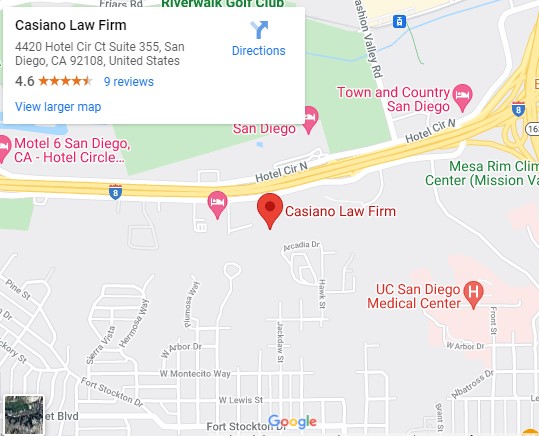Wills and Probate Myths
People have many misconceptions about different aspects of estate planning, such as wills and trusts, probate courts, and anything related to their asset management. Some people think that probate courts are automatically out of the question, while others think that only the elderly need to create an estate plan or write wills and trusts.
The fact of the matter is different clients have different situations, and it’s essential that an experienced estate planning attorney considers your specific situation. Not only can an estate plan help you with asset protection, but this also allows you to manage your wealth and property better, even when an unfortunate event happens.
At the Casiano Law firm, San Diego lawyer Vinny Casiano is able to provide legal advice to clients from various contexts. He is dedicated to giving you your best experience in handling these cases, using his skills and experience to make it smooth sailing for you and your loved one.
Why do I need a Will?
A proper Will can allow your loved ones to undergo a smooth and proper probate law procedure. A well-written will allows your executor to proceed with your estate planning according to your specific requests, ensuring that you have a voice in the matter even after your death. The will is key in every estate plan so that your loved ones receive your assets the way you intended it to happen.
Aside from the emotional incentives for clear estate planning, several decidedly pragmatic reasons exist to set your affairs in order. Chief among these is taxation. Your estate may be subject to federal, California state, and estate tax. Without careful management, the impact of these tax codes can be financially significant.
Here are five of the most common myths and misconceptions regarding wills and the probate process.
Myth 1: My assets go to the State / are sold away if I don’t submit my Will.
Myth 2: My Will / Trust needs to be notarized to be valid.
Myth 3: My debt will go with me to the grave once I die.
Myth 4: Even if I file my Will, it will still go into probate court.
Myth 5: A Will is incontestable.
These different myths also note that a lot of the confusion can be avoided by consulting an estate planning attorney. They can help clarify the grounds of your wills and trust and help you in the probate process.
Myth 1: My assets go to the State / are sold away if I don’t submit my Will
Although a probate court proceeding takes up a fair amount of cost, this does not mean that the State is taking away your assets directly. The initial fee for probate filing is around $350 in San Diego, while the asset appraisers are usually paid depending on the size of the estate. Usually, attorney fees and other court-related payments make up the bulk of fees needed for a probate proceeding.
The only issue without having a will is that it holds the property up during the time of the probate proceeding, meaning it is not accessible for use. Without a proper Will, the chance of auctioning estate or registering other assets like vehicles becomes much harder.
In the instance that your will is not furnished before probate proceedings, your real estate and other assets are not transferred to your spouse or heirs immediately, resulting in it incurring payments from insurance companies and government taxes. Your debts are also going to be considered during this period, so creditors are still allowed to ask for debt payments.
Myth 2: My Will / Trust needs to be notarized to be valid.
Different states can have different laws regarding the validity of the Last Will or a Trust. While some states accept a notarized will, there are strict guidelines in place In California to make sure that the will is considered valid. A typed Last Will and Testament Are required to be executed by a testator and two disinterested witnesses. On the other hand, a handwritten Last Will and Testament can be unknown to others aside from the writer. This is called a holographic will.
A notarized will is incomplete in these two cases because it is a typed will with only one witness. Because of the nuances in state law, it is essential to talk to an experienced attorney about Wills and Trusts.
Myth 3: My debts will go with me to the grave once I die.
This is one of the more popular myths about estate planning, especially when people have unfinished debt before their death. This situation is much more complicated than how movies make it seem. In general, your debt is first paid through your remaining assets. This means that only after your debts are paid as well as your funeral funds and other taxes like the estate tax, that’s the only time your beneficiaries, like your family member, will be able to access your remaining assets.
On the other hand, if you do not have enough estate to pay off your current debt, that’s the only time it will be considered insolvent. Each debtor may receive partial payment depending on different factors. Because of this process, your estate usually becomes tied up in court proceedings until everything gets settled.
Myth 4: Even if I file my Will, it will still go into probate court.
While it seems that probate courts are the end-all-be-all of estate planning, not all wills actually go through one. With careful planning, finding exceptions when filing your will is possible.
Probate proceedings usually aren’t needed depending on the state for specific types of the estate, like small estates, joint assets, or properties under an irrevocable trust. It is possible to set up a proper plan so that you can avoid probate court using your Will, Trust, and other types of estate planning documents. Not only is this a time and hassle-saver, but this also lets you save money from the cost of probate.
Myth 5: A Will is incontestable.
If the distribution of inheritance is stated directly in a Will, then it will be followed by the court as close as possible. That doesn’t mean that family members, especially in cases of disinheritance, cannot do anything about it. While this means that they have the option to file a reconsideration claim, it doesn’t mean that it will go their way. Some factors that could be used as grounds for reconsideration are fraud, influence by another party, and lack of capacity. An experienced will and probate lawyer will be able to help you navigate these types of cases when they come up.
Talk to a Wills and Probate Attorney in San Diego Today!
Many of the myths we’ve encountered stemmed from misconceptions about legal concerns revolving around estate planning. While it feels confronting at the start to think about these processes, we must consider these decisions to save our loved ones from confusion, conflict, and financial hardship later on.
Attorney Vincent Casiano’s San Diego law office can make the process easy for you. Vinny Casiano is a knowledgeable and experienced wills, probate, and estate planning attorney who can offer legal services to San Diego, California clients. He also covers other practice areas, including living trust disputes, trust administration, and other types of planning. If you are interested in learning more, talk to us at Casiano Law Firm to explore your options!

